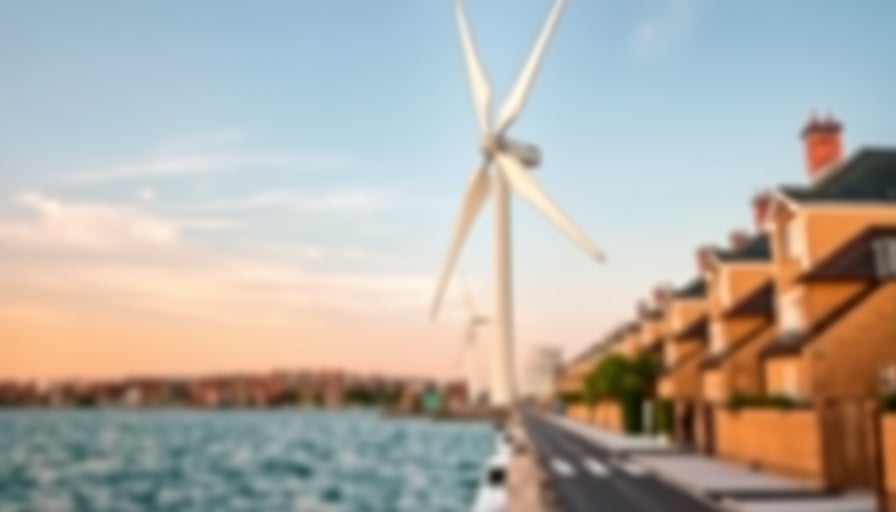Iberdrola’s Market Performance and Strategic Expansion in Renewable Energy
Iberdrola SA, one of the largest utilities in Europe, has recently achieved a series of milestones that reinforce its position as a leading player in the transition to a low‑carbon energy system. The company’s share price has surpassed €17 for the first time, a historic peak that follows a sequence of record highs in the weeks preceding its Capital Markets Day (CMD) in September. The CMD, which highlighted Iberdrola’s growth prospects and commitment to renewable energy, provided additional support to investor sentiment and helped lift the stock to its current valuation.
Share Price Dynamics and Investor Confidence
The share price rally can be attributed to a confluence of factors. First, the CMD presented a clear view of Iberdrola’s long‑term strategy, emphasizing the company’s expansion into offshore wind and battery storage, as well as its focus on maintaining a resilient electricity supply through diversified generation. Second, the market’s perception of Iberdrola’s ability to deliver consistent revenue growth in the context of a tightening supply chain for wind turbine components has bolstered confidence. Finally, the company’s robust financial metrics—strong free‑cash flow, disciplined capital allocation, and a solid dividend policy—have reinforced its attractiveness to both institutional and retail investors.
Offshore Wind Expansion: The East Anglia 2 Deal
Iberdrola is actively pursuing growth in the offshore wind sector, with a particular focus on the United Kingdom. The company is in advanced negotiations to acquire a 49 % stake in the East Anglia 2 offshore wind farm. This project, located in the North Sea, is expected to add significant capacity to Iberdrola’s renewable portfolio and reduce its overall carbon intensity. By partnering with local stakeholders, Iberdrola aims to secure a long‑term supply of clean electricity for the UK market, while simultaneously diversifying its geographic footprint.
The East Anglia 2 deal aligns with broader European energy policy objectives that favor offshore wind development as a key component of the decarbonisation pathway. The UK government’s commitment to net‑zero emissions by 2050, coupled with incentives for offshore wind, creates a favorable regulatory environment for Iberdrola’s investment. Moreover, the company’s existing experience in offshore wind operations—evidenced by its portfolio of projects across Spain, Portugal, and the United States—provides it with the operational expertise necessary to maximise the economic return on this investment.
Power Distribution Growth and Battery Energy Storage
Iberdrola’s distribution business has experienced a 6 % increase in electricity sales across the first nine months of the year, signalling robust demand for its retail services. This growth is supported by a broader trend of electrification of the transport and heating sectors, which has intensified the need for reliable distribution infrastructure.
In line with its strategic emphasis on clean energy, Iberdrola recently completed the acquisition of a 270 MW battery energy storage system (BESS) project in South Australia. This investment underscores Iberdrola’s commitment to deploying energy storage solutions that enhance grid stability and enable the integration of variable renewable generation. By adding storage capacity in a region with a high penetration of solar and wind resources, Iberdrola improves the flexibility of the Australian grid and reduces the need for peaking fossil‑fuel plants.
The South Australian BESS acquisition also highlights Iberdrola’s willingness to engage in global markets outside of Europe, signalling a broader diversification strategy that mitigates concentration risk and captures growth opportunities in emerging markets with strong renewable mandates.
Partnerships and Nuclear Energy Strategy
Iberdrola has partnered with Endesa to propose a joint partnership with the Spanish government aimed at maintaining the operation of Spain’s nuclear power plants. While the company’s core focus remains on renewable energy, this collaboration reflects an understanding that a stable and diversified generation mix—including nuclear—remains essential for ensuring continuity of supply during periods of high renewable output variability.
The nuclear partnership is consistent with Iberdrola’s long‑term strategy of maintaining a resilient grid and demonstrates its willingness to engage in public‑private collaborations that serve national energy security objectives. By working with the government and other industry stakeholders, Iberdrola positions itself as a key contributor to Spain’s energy transition, ensuring that the country meets both its decarbonisation targets and reliability requirements.
Strategic Positioning and Competitive Landscape
Iberdrola’s focus on offshore wind, battery storage, and a diversified distribution network places the company favorably against competitors such as Enel, EDF, and EDP. While all these utilities are expanding their renewable portfolios, Iberdrola’s integrated approach—combining generation, storage, and distribution—provides a competitive edge in terms of operational efficiency and customer value proposition.
The company’s emphasis on partnerships, both in the UK and Spain, allows it to share risk, accelerate technology deployment, and benefit from local regulatory frameworks. Additionally, Iberdrola’s strong balance sheet and disciplined capital allocation policy give it the flexibility to pursue opportunistic acquisitions that strengthen its market position without compromising financial stability.
Economic Context and Broader Implications
The recent market performance and strategic moves by Iberdrola reflect broader macroeconomic trends, including:
- Renewable Energy Growth: Global investment in offshore wind and battery storage is accelerating, driven by climate commitments and falling capital costs.
- Energy Transition Financing: Asset quality and long‑term returns attract institutional investors, supporting the valuation of utilities that are leading the transition.
- Infrastructure Modernization: Governments worldwide are prioritising grid upgrades and storage solutions to accommodate higher shares of variable renewables.
- Geopolitical Considerations: Diversification into markets like South Australia reduces exposure to geopolitical risk and strengthens Iberdrola’s global resilience.
Iberdrola’s trajectory indicates that a combination of strong financial performance, strategic asset acquisitions, and collaborative partnerships can drive sustainable growth in the evolving energy landscape. Its continued focus on reducing its carbon footprint while maintaining grid reliability positions the company as a benchmark for other utilities navigating the transition to a low‑carbon economy.
